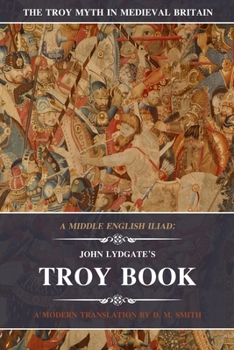A Middle English Iliad: John Lydgate's Troy Book: A Modern Translation
In medieval Britain, the works of Homer were practically unknown. In his absence, the half-remembered story of the Trojan War took on a distinctly Arthurian flavour, with the heroes Achilles and Hector reimagined as armoured knights on horseback, duelling with broadsword and lance. In 1412 the Prince of Wales commissioned John Lydgate, monk of Bury St. Edmunds Abbey and literary heir of Chaucer, to write him an English epic to rival those in the French and Latin. The result was Troy Book: 30,000 lines of decasyllabic rhyming couplets, completed in 1420 and dedicated to its patron-now King Henry V. Lydgate's primary source was the Latin prose Historia Destructionis Troiae of Guido delle Colonne, with supplementary material provided by Ovid, Chaucer's Troilus and Criseyde, as well as a variety of obscure Late Latin texts, such as Isidore of Seville's Etymologiae, and the Mythologiae of Fulgentius. With this edition Troy Book receives its first translation into Modern English, allowing a new generation of readers to view the Trojan War through the eyes of a fifteenth-century Briton. D. M. Smith includes a detailed introduction tracing the development of the Troy myth from the Cyclic Poets to Lydgate and beyond, along with extensive notes on Lydgate's sources, and the narrative's relationship with the established Graeco-Roman mythology. Long dismissed as a medieval curiosity, Troy Book is at last restored to its proper context in the literary evolution of the Ancient Greek Epic Cycle.
Format:Paperback
Language:English
ISBN:1731538464
ISBN13:9781731538468
Release Date:December 2018
Publisher:Independently Published
Length:756 Pages
Weight:2.19 lbs.
Dimensions:1.5" x 6.0" x 9.0"
Related Subjects
PoetryCustomer Reviews
0 rating





